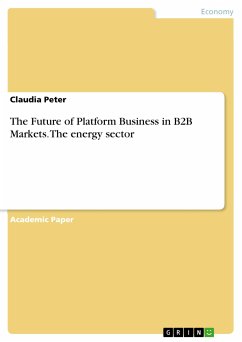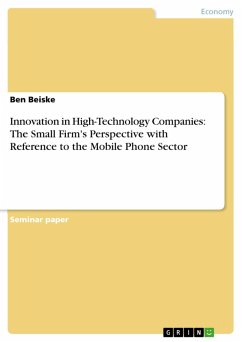Academic Paper from the year 2021 in the subject Business economics - Miscellaneous, grade: 1,7, The FOM University of Applied Sciences, Hamburg, language: English, abstract: This paper poses the following questions: What is the future of Platform Business in B2B markets? How is the energy industry affected and what are fields of action to catch-up or outperform in this economic area? To examine the research problem, a descriptive method based on secondary literature, reports and statistical data will be performed. Research in this area has been limited to the energy sector with an in depth status quo and recommendation for action towards E.ON SE, one of the largest energy companies in Germany. From a structure point of view, the study begins with definitions of basic terms, followed by the central chapter 'B2B Platform Business in the energy sector'. The central part is divided into three sub sections, where first of all the status quo regarding B2B platform business at E.ON will be examined, following by an analysis of current trends regarding B2B platform business. The third sub section discusses fields of action for future B2B platform business at E.ON. Finally, a conclusion and outlook will summarize this research. With the rapid development of the internet and digital technologies, platforms already have grown to a global phenomenon in 2016. Nowadays, the COVID-19 pandemic further accelerated the digital transformation, which led to more progress and diversification of digital platforms. The rise of platforms like, e.g., Uber, AirBnB and Alibaba already disrupted traditional business models by connecting people, organizations and resources in an interactive way via digital technology. Through climate change in combination with digitization and new technologies, like smart meters, deep learning and a substantial stream of software platforms, the energy industry experienced massive changes due to the appearance of B2B platform businesses, such as virtual power plants or smart home platform solutions. These developments demonstrate the importance for strategic corporate management to stay up-to-date and to elaborate new B2B platform business models in order to remain profitable and competitive.
Dieser Download kann aus rechtlichen Gründen nur mit Rechnungsadresse in A, B, BG, CY, CZ, D, DK, EW, E, FIN, F, GR, HR, H, IRL, I, LT, L, LR, M, NL, PL, P, R, S, SLO, SK ausgeliefert werden.









